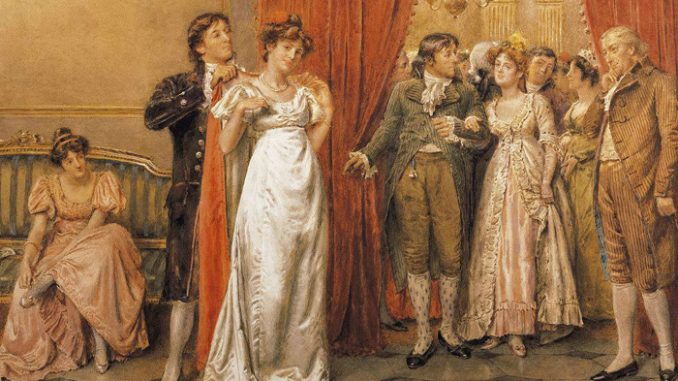
Victorian people are known for their stick to rules, forms and harsh. As a member of the upper class in Victoria during the Victorian period (1837-1901 during Queen Victoria’s reign), it was necessary to have a detailed understanding of all the etiquette and etiquette that met their status. It now appears that many of these rules may seem arbitrary and stupid. For example: Is the order of the dinner guests’ presence really important? In fact, it was really important during Victorian times! Because it is the small details of these social proprieties that form the basis of etiquette and courtesy.
Of course, some rules of proprieties are indeed arbitrary, but despite these, these rules and regulations are very effective. Every society will have such rules through which to build blueprints and maintain order. For example, drive keep the left or keep the right? In the Victorian period, proprieties reduced many troubles to the social alternation, such as making new friends, keeping in touch with old friends, and even cutting off contacts with misconduct friends. These are all will follow the rules! However, the most important thing is that compliance with these rules can help them show they respect for others, including servants, acquaintances, nobles, and clergy. At the same time, these rules may also be a bit overdone. Obviously, even social critics at the time mostly hate these tedious proprieties. Today we will lead everyone to experience some absurd rules.
1. Fashion Icon

People in the Victorian era are convinced that the importance of should be dressed appropriately when all occasions. Although women dressed up very simply in the early 19th century, in the Victorian period, the trend of fashion has returned to the exquisite and solemn, elegant dress. The ordinary girl’s closet must be filled with many different styles of skirts, including dance parties, dinners, walks, carriages, and village and evening dresses. In mourning for the deceased husband, father, brothers, and sisters or even relatives, the length of time wear black also has strict rules. There is no doubt that during the Victorian period, the funniest clothing in the woman’s closet was skirt support. Women must also relearn elegant sitting postures. In any case, the skirt support was a symbol of fashion at the time, and each of the elegant ladies of the upper class had one.
2. Street Greetings

There are strict guidelines for social behavior during walks and on the street side of the road, especially between the sexes. Young unmarried women cannot go out without accompanied. Etiquette forbids Ladies to look around for acquaintances or stop at crowded streets. When young women did see her gentleman friend and felt that she could not be ignored, she would have to take the initiative and reach out. The gentleman can only wait for the lady to recognize him and he can take off his hat. The gentleman will never smoke in the face of ladies.
3. Introduce Appellation

The etiquette introduction is very important to Victorian period people. Generally speaking, people with lower social status are introduced to people with higher social status. However, women are generally introduced to gentlemen first regardless of their status.
4. Business Card Knowledge

If you visit the town, you will usually visit go around and leave a business card. This means that you are here and are planning to visit your old friend. The person who receives the business card will usually reply the business card or visit directly within one week.
5. Call At Somebody’s House

When both the host and guest prepare for or accept a formal visit, they will generally not wear bright colors. For the formal courtesy of the clothing requirements, as long as the simple and natural. In fact, the visiting time of the visitors often depends on how close the relationship with the owner is. The better the relationship, the guests can come to later. When guests arrive at the host’s home, the butler will usually take them to the parlor, which is also usually used to place guests.
6. Dinner Time

The Victorian period dinner was called a potential minefield in society at the time. First of all, guests are generally asked to come 15 minutes late. When they arrive in the living room, the servants will announce that the banquet is about to begin. After that, the guests will enter the restaurant to prepare to eat meals.
7. Face The King

This pilgrimage and other social activities are performed several times a year and are personally conducted by the Queen or Crown Prince. Young girls must participate, and young men of the upper class must attend. At the end of the ceremony, young men and women who have not yet married can enter the marriage market to seek a spouse.
8. Courtship Of Men And Women

In the Victorian period, the British were confident that their attitude toward love between men and women was much more open than that of the French and they were proud of it. The Victorian era was the era when the British capitalist society developed to its peak. The economy was prosperous and the society was stable. Therefore, young people would take into account more material conditions when choosing a spouse. They valued the right people, and their emotional needs decreased.
9. Ballroom Communication

For young people in the Victorian era, the dance was undoubtedly the most exciting part of their social life. The lucky ones invited to participate will be officially invited three to six weeks before the dance party is held and they need to reply within one day. The host will carefully dress up the ballroom, including opening the door, removing the carpet, polishing the floor, decorating as many lights as possible, preparing food and tableware, buying flowers, and hiring an orchestra. It is especially important to choose the dance partner for the last dance before the dinner because they will have dinner together.
10. The Rules Of Engagement

When a Victorian gentleman wants to marry her, he first needs to “confirm the true feelings of the girl before him.” Immediately afterward, he needed the consent of the woman’s father before the formal engagement. Before the parents agreed, the couple had to suspend contact. After the engagement, the newcomers must behave well before the wedding. The woman still needs to be accompanied by her female companion because she is not allowed to go out with her fiance.

Leave a Reply